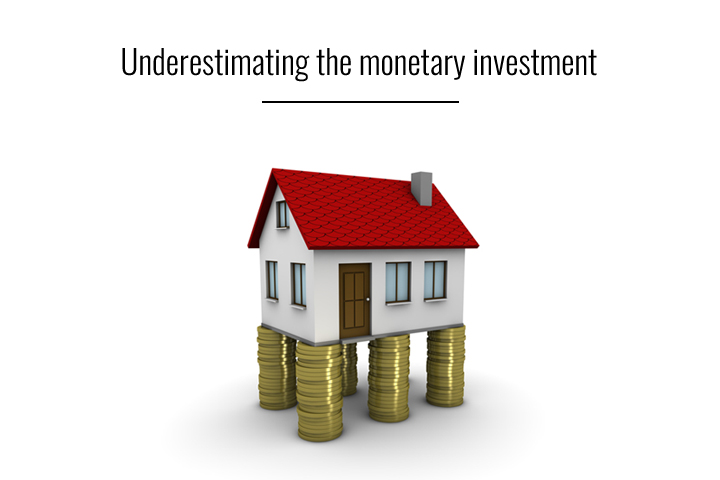
To an outsider, someone who glances at the raw numbers of property management, being a landlord might seem fairly easy. All you have to do is buy the property, find someone to live in it, and pull in the profits, right?
But this isn’t the case, unfortunately. If you become a property manager, you’ll be responsible — often single-handedly — for overseeing an array of different processes, from screening tenants to making repairs and upgrades. Any mistake could saddle you with a long-term issue that seriously affects your bottom-line numbers and puts additional stress on yourself.
Which is to say, being a landlord is a complicated endeavor, and it could leave you vulnerable. Watch out, and make sure you make proactive corrections for the ten following substantial property management mistakes:

When you take your first look at the numbers associated with being a landlord, it’s easy to get excited. You’ll compare your monthly mortgage payment to what you can charge in rent, and assume you’ve got a significant profit margin. But you might be overlooking all the peripheral monetary investments that figure into the successful management of properties. If you want a more accurate picture, you’ll need to forecast and estimate the costs for future home repairs and renovations, even for such simple items as flowers or fresh coats of paint. Little things add up, so it’s a mistake to neglect them.
There’s also a common misconception that being a landlord involves sitting back and waiting for rent checks to roll in. Actually, you’ll have to contribute plenty of your personal time to the job. You’ll need to show up on site for repairs and renovations, address and mediate any tenant concerns … and, depending on your market, when one of your properties is vacant, you may have to work hard to get the space filled again. If you aren’t ready for these time commitments, you’ll spread yourself too thin or become overwhelmed not long after you’ve started.
Tenant screening is one of the vital stages of property management; it’s when you decide who’s going to stay there. Obviously, not all tenants can be rock stars with perfect records, clean credit history, a respectful demeanor, and plans to settle in for the long term. So it’s worth an extra effort to poke around in your prospective tenants’ histories. One bad tenant can create a huge disaster for your property, and it’s not always obvious who that person is going to be.
As soon as one of your tenants moves out, you’ll have a void in your income, and you’ll be tempted to fill it as soon as possible. The logic is simple and reasonable: The sooner you get a new tenant into your property, the sooner your revenue stream will return to normal. However, this approach overlooks one vital truth: Not all tenants are equally valuable. Waiting an extra month or two for a long-term tenant who respects your property and pays rent on time is well worth your patience and a temporary revenue loss.
It’s true that you shouldn’t rush to fill that tenancy void, but you also can’t sit around hoping for the right one to come along. It’s a smart idea to trust referrals or post a sign in your yard about available space, but if you want to make the most of the situation, you’ll have to put in more effort than that. It means getting involved in marketing and advertising, and becoming more serious about the tenant screening process.
Some tenants may be in a hurry to find a new place, and might hope to seduce you into skipping the screening process by making you a significant cash offer. They might suggest a substantially high down payment up front, with several months of rent paid in advance, in exchange for getting the keys right away. Such an offer is highly appealing, of course, but you should be aware that it’s a common tactic among criminals and people who have otherwise shady histories.

It’s good to be invested in your property on a personal level — to an extent. If you become too emotionally attached to your house or building, though you’re more liable to take it personally when damage occurs, or you’ll stop seeing it as an investment opportunity. Try to stay as objective as you can, and remember that this is primarily a method of making money.
One would hope you’d be on good terms with your tenants, but try not to get too close on a personal level. If you do, the conflict resolution process becomes significantly more challenging, and you end up making already-difficult decisions even more stressful. This doesn’t mean you should close yourself off and become emotionally distant, but do try to maintain a reasonable degree of professionalism.
Confrontation is hard, especially if you pride yourself on maintaining good landlord-tenant relationships. It’s not easy to address a late-payment issue, or raise a bad habit that needs correcting, but these are confrontations you’ll have to face if you want your investment to retain its value. This is especially true with larger buildings, where your tenants are more often going to affect one another.
Refusing to correct a significant problem, for any reason, is going to hurt you. If you can’t offer an immediate solution, try a temporary one, or suggest a compromise. If you don’t take action, your tenants will grow frustrated, and in some cases, they might even choose to take legal action against you.
The preceding ten errors aren’t the only ones that can affect your property management, but they are among the most common, and some of the most important to avoid. If you can successfully navigate around these, you’ll be better positioned to turn a profit, keep your tenants happy, and most importantly, remain a landlord without pulling your hair out.

Of course, property management can still be stressful, even if you cover all these possible missteps. But you don’t have to do it alone. If you’re looking for a partner to help you find better tenants, manage your properties more efficiently, and ease the burden on yourself, contact Green Residential for more information about how we can help.
